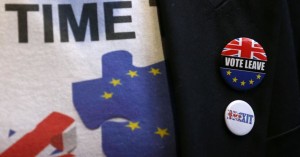Leave or Remain, la voglia di guerra. Intervento in esclusiva per l’Italia dello storico Richard Overy
giugno 20, 2016 in Approfondimenti, Crisi da Mario Baldoli
 Giovedì 23 è il giorno del referendum in Gran Bretagna su lasciare (Leave) o restare (Remain) nell’Unione Europea.
Giovedì 23 è il giorno del referendum in Gran Bretagna su lasciare (Leave) o restare (Remain) nell’Unione Europea.
La campagna elettorale ha avuto una vittima: la deputata laburista Jo Cox è stata uccisa da un sostenitore del Leave. Non è un caso: molti hanno le mani sporche di sangue, come si dice In UK, ricordando sempre Lady Macbeth.
Lo scontro sul referendum è stato condotto razionalmente fino a pochi mesi fa, discutendo su qual è l’identità della Gran Bretagna, quella erede e forte di un grande Impero, o quella che ha difeso i diritti civili e potrà lavorare positivamente per l’Europa? Cosa può dare all’Europa e cosa ricevere in termini economici, politici e sociali?
Tali ragionamenti sono crollati sotto la valanga delle ultime idiozie dei Leave, tali come forse non è mai accaduto in Europa. Si può leggerne una raccolta nel sito www.infacts.org. Per dirne una: uscendo dall’UE e bloccando i migranti, la Gran Bretagna risparmierà per la sanità 350 milioni di sterline alla settimana.
Su Leave o Remain ospitiamo in fondo all’articolo un intervento dello storico Richard Overy, il più grande studioso al mondo della II guerra mondiale, sei suoi libri sono stati tradotti anche in italiano. Di lui G9 ha scritto in passato proponendo la traduzione del suo ultimo saggio The Bombing War. Gentilmente il prof. Overy ci ha inviato il testo da lui letto alla BBC a favore del Remain.
Per il Remain sono infatti la grande maggioranza degli intellettuali, vedi www.academicsforbritainineurope.org, sono per l’accoglienza ai profughi, l’integrazione del Paese con l’Europa e il mondo. Il sindaco appena eletto a Londra è un laburista figlio di pakistani e di religione islamica. Ma la scelta Leave o Remain divide trasversalmente i partiti, anche se il Labour è prevalentemente favorevole e il Tory contrario. La crisi ha portato molti lavoratori, anche nella Scozia, base dei laburisti, a rifiutare gli immigrati, temerne la concorrenza sul lavoro e nell’assegnazione delle case, quindi a schierarsi per i Leave.
Nella tragedia, che resta una tragedia, si innesta la farsa: il primo ministro David Cameron si è fatto eleggere promettendo il referendum, nel quale è schierato per il Remain. Il suo ex amico Boris Johnson, precedente sindaco di Londra, guida i Leave. In passato Johnson aveva chiesto all’Unione europea di fissare la circonferenza dei wurstel e le dimensioni dei preservativi. Fino a due settimane fa il Remain era in vantaggio, poi è subentrato l’irrazionale con gli interventi sempre più violenti di Nigel Farage, leader dell’Ukip: chiudere le frontiere, allontanare i migranti che non portano utili (soldi e cultura) o residenti da poco in UK, con qualche eccezioni per gli italiani, dato che i grillini fanno gruppo con lui in Europa. Le colonne dei migranti a Calais in attesa di passare la Manica hanno fatto balzare in testa il Leave. Tra parentesi: gli inglesi sono tra i maggiori lettori di giornali in Europa, ma per lo più leggono il “Sun”, un’enciclopedia di pettegolezzi che sarebbe meglio non leggere, a meno che non si voglia sapere come fa la pipì il nipote della regina.
Non entro in tragedie umane, previsioni economiche, scenari politici che sono noti e mutano continuamente. È evidente che qualunque sia l’esito del referendum, produrrà una spinta centrifuga nell’UE (la quale, col suo statuto liberista, non è priva di colpe rispetto a quanto oggi succede ai suoi confini e al suo interno). Il sogno di un continente che fu patria di tutte le guerre, finalmente pacificato, come avviene dal 1945, si è interrotto. Il Manifesto di Ventotene elaborato da Altiero Spinelli, l’Europa realizzata da De Gasperi, Schuman e Adenauer, a cui era favorevole anche Churchill, subirà una scossa profonda. La diffusione delle guerre in Africa e in Asia è ai nostri confini, ci sono guerre in Turchia e in Libia. Si può dire rovesciando Kant: la guerra è il regresso dell’uomo allo stato di minorità imputabile a lui stesso. Facciamoci la guerra, così magari usciamo dalla crisi.

Why Britain should be in Europe
by Richard Overy*
In the current wave of anniversaries commemorating the two World Wars, it is striking how much emphasis there has been on Britain’s contribution to the process of building a free and liberal Europe. It is an important component of contemporary British identity that British soldiers, sailors and airmen fought and died not just to defend Britain, but to ensure that all Europeans should share the prospects of greater economic security, an end to political tyranny and a common democratic culture. This was indeed the ideal, popular with broad elements of the British wartime population, which accepted the sacrifices made in the campaigns in Europe if the promise at the end of the war was a continent cleansed of extreme nationalism, racism and political repression.
The historical reality was, of course, rather different. Britain’s liberal credentials were compromised by the existence of an Empire in which the freedoms fought for in Europe in two World Wars were denied to the non-white peoples. British identity until the middle of the last century was schizophrenic – one part composed of the belief that British political evolution represented the progressive development of a free and tolerant society, the other part composed of popular memory of centuries of warfare, violent imperialism and national self-assertion. The post-1945 order saw the rapid eclipse and disintegration of the imperial project for Britain and for all the other European empires, changing forever the nature of Britain’s place in Europe and of British identity. But the wartime ideal of liberating Europe was subsequently undermined by the coming of the Cold War which divided the continent once again into rival ideological blocs potentially as dangerous as the ideological confrontations of the 1930s. Few people looking forward from 1945, or even 1985, would have imagined a continent-wide European Union in which national, ideological and racial rivalries had been transcended in a common commitment to shared, economic, social, cultural, and security interests.
Britain is an essential element of that new Europe. That strand of British historical identity which emphasized Britain’s place in encouraging the broader development of modern parliamentary institutions, economic freedoms and a tolerant, liberal society is the one that matters, not the memory of military and imperial glories, or the belief that there is something historically unique or special about Britain’s past that separates the British experience from the rest of the European continent. If these values were worth fighting for in ten years of bitter warfare in Europe between 1914-18 and 1939-45, they are worth defending in today’s Europe. But that can only be done from the inside. British involvement in Europe is not solely about this or that economic advantage. It represents a commitment to ensuring that the narrow nationalism, ideological divisions, imperial jealousies, economic rivalry and overt racism that plagued the emergence of modern Europe from the late nineteenth century will never be repeated.
The current referendum debate has focused too much on the economic fears or promises that remaining in or out  might bring. The European Union project is much more than the sum of its economic, social, medical, and security components. Some of those strands that undermined European societies in the twentieth century – a self-interested nationalism, racism, social intolerance – are never far below the surface. A British presence in Europe is about ensuring that the core values of free and liberal societies are protected by common endeavour, not as before through occasional violent intervention. The European Union is not a perfect system by any means, though it is infinitely preferable to the way Europe looked for much of the last century. But rather than struggling to avoid any commitment to making that Union better by leaving it, Britain can sustain that strand of British identity built on its liberal and democratic past by working within the Union to achieve reforms that reflect those traditions.
might bring. The European Union project is much more than the sum of its economic, social, medical, and security components. Some of those strands that undermined European societies in the twentieth century – a self-interested nationalism, racism, social intolerance – are never far below the surface. A British presence in Europe is about ensuring that the core values of free and liberal societies are protected by common endeavour, not as before through occasional violent intervention. The European Union is not a perfect system by any means, though it is infinitely preferable to the way Europe looked for much of the last century. But rather than struggling to avoid any commitment to making that Union better by leaving it, Britain can sustain that strand of British identity built on its liberal and democratic past by working within the Union to achieve reforms that reflect those traditions.
A British withdrawal from the European Union can only be interpreted from outside as a rejection of those traditions, a desire to reinstate a narrow national self-interest in place of a collaboration that has displaced centuries of conflict, a wish to wallow in a sentimental and unhistorical image of Britain’s past, and a rejection of the belief embedded in the current wave of military commemoration that Britain had, and still has today, something positive to contribute to the evolution of modern Europe.
*Richard Overy is Professor of History at the University of Exeter. He has published widely in modern European history and is a Member of the European Academy of Sciences and Arts.





